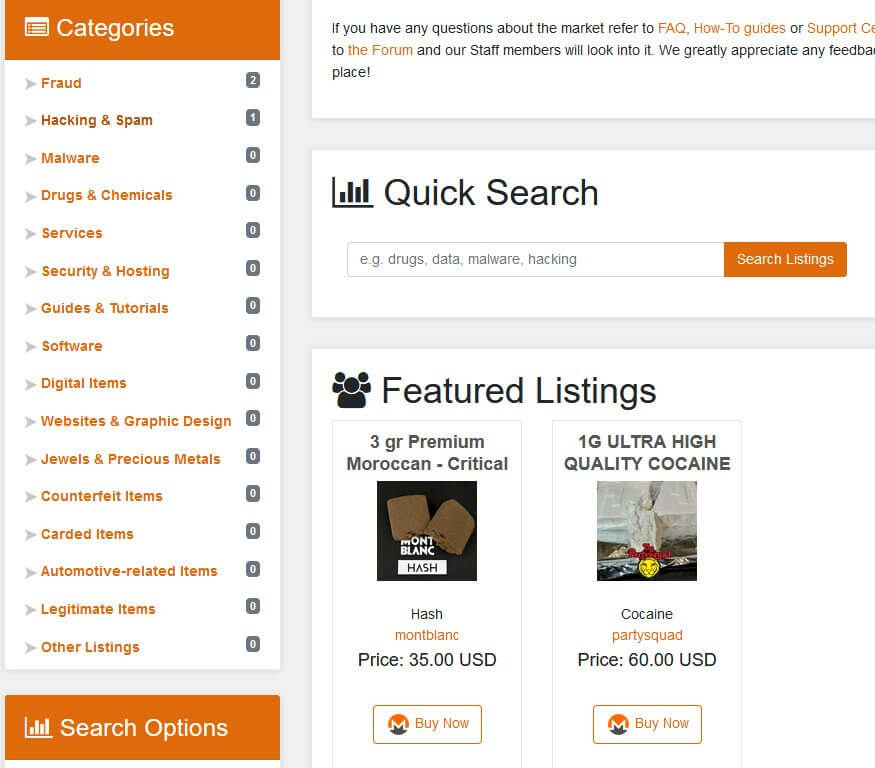The rise of the shadowy web has transformed the domain of digital trade, giving rise to a new type of marketplaces that exist beyond the reach of conventional law enforcement. These illicit marketplaces, often accessed via the secrecy of digital currencies, enable users to trade a wide array of goods and services—including legal and illegal items. Including digital privacy tools to illegal goods, the allure of the darknet lies in its guarantee of discretion and the freedom to participate in trades that mainstream internet cannot accommodate.
As users gather at these secretive sites, they leverage the unique capabilities of crypto currencies like Ethereum, creating a intricate network of transactions that contest traditional financial systems. While some may search for these markets to obtain unique collectibles or privacy tools, others delve into hazardous venues where banned items and forbidden services are just a click away. This write-up delves into the intriguing world of hidden web markets, investigating their operations, consequences, and the continuous struggle between policing agencies and anonymous online traders.
Grasping this Dark Web
This hidden part of the internet is a segment of our internet that is not visible by traditional search engines, making it accessible only through certain software, configurations, or permissions. It operates on an encrypted network, ensuring users’ anonymity and safety. This setting attracts a range of activities, from authentic privacy-focused communications to illicit transactions. The notion of the dark web often tends toward sinister use, but it is vital to understand its intricacy.
On the dark web, multiple marketplaces have emerged, where goods and services can be exchanged with little oversight. These markets typically focus on products that vary from virtual services, such as hacking tools and stolen data, to material items like drugs and counterfeit goods. The anonymity offered by cryptocurrencies plays a major role in enabling these trades, as buyers and sellers engage without the need to reveal personal information. This creates a distinct economy, driven largely by the desire for privacy and the demand for goods that are either illegal illegal or difficult to obtain on the surface web.
Moving through the dark web requires care and a basic knowledge of how its structure functions. Accessing these concealed areas involves using particular browsers like Tor, which hides traffic and helps protect users from surveillance. While the dark web can be a refuge for those looking for privacy or escaping oppressive regimes, it also carries inherent risks, such as scams, exposure to illegal content, and potential legal ramifications. As users venture into this hidden layer of the internet, they must weigh the benefits against the risks associated with its use.

The Rise of Digital Currency in Underground Markets

The emergence of cryptocurrencies has significantly transformed the landscape of underground marketplaces. Originally, these sites relied on traditional financial transactions, which frequently led to tracking and law enforcement intervention. With the adoption of Bitcoin and other cryptocurrencies, users achieved an unmatched level of anonymity, allowing them to conduct transactions without disclosing their identities. This shift not only supported the expansion of these markets but also attracted a larger range of buyers and sellers seeking to partake in illicit transactions without the fear of detection.
Cryptocurrencies provide both buyers and sellers with distinct advantages in underground markets. Deals are decentralized, making it hard for authorities to track the movement of money. Features such as anonymity and encryption further protect users, guaranteeing that their financial activities remain concealed. As a consequence, many underground marketplaces have embraced cryptocurrencies as their primary mode of payment, with Bitcoins leading the way due to its broad recognition. Nevertheless, other digital currencies, such as Monero and Ethereum, have also secured traction for their enhanced privacy attributes, further broadening transaction methods available to users.
The surge of digital currency in dark markets has not gone ignored by authorities and regulatory bodies. As the utilization of these digital currencies proliferates in criminal activities, authorities are increasingly intervening their application. darknet market links This has led to the creation of tools and strategies aimed at monitoring and regulating digital currency exchanges. Despite these obstacles, the appeal of anonymity and the decentralized nature of cryptocurrencies continue to drive their popularity within underground marketplaces, suggesting that they will remain essential to this underground economy for the foreseeable future.
Threats and Repercussions of Engaging with Dark Web Markets
Engaging with dark web markets presents various many dangers that can have significant law-related and financial repercussions. One of the most notable risks is the likelihood for law enforcement involvement. Governments around the world are increasingly watching dark web activities, and a number of individuals have faced arrests for purchasing or selling illicit goods. Engaging in these platforms can lead to investigations that expose users to legal accusations, penalties, and even imprisonment.
In addition to legal risks, there are significant security concerns associated with darknet transactions. The secrecy that these markets offer can attract malicious individuals, including scammers and hackers. Users may find themselves targets of fraud, losing money without receiving the promised goods. Moreover, there is the risk of receiving dangerous or substandard products, which can lead to physical harm or financial loss. The absence of regulation means that recourse for those affected is virtually absent.
Finally, engaging with darknet markets can have lasting effects on an individual's private and professional life. Being involved in illegal activities can tarnish a person's reputation, affecting employment opportunities and social connections. The online trace left behind can also lead to ongoing scrutiny and worry, as users constantly worry about being monitored or exposed. The appeal of fast profits can blind individuals to the long-term implications that such involvement may entail.
